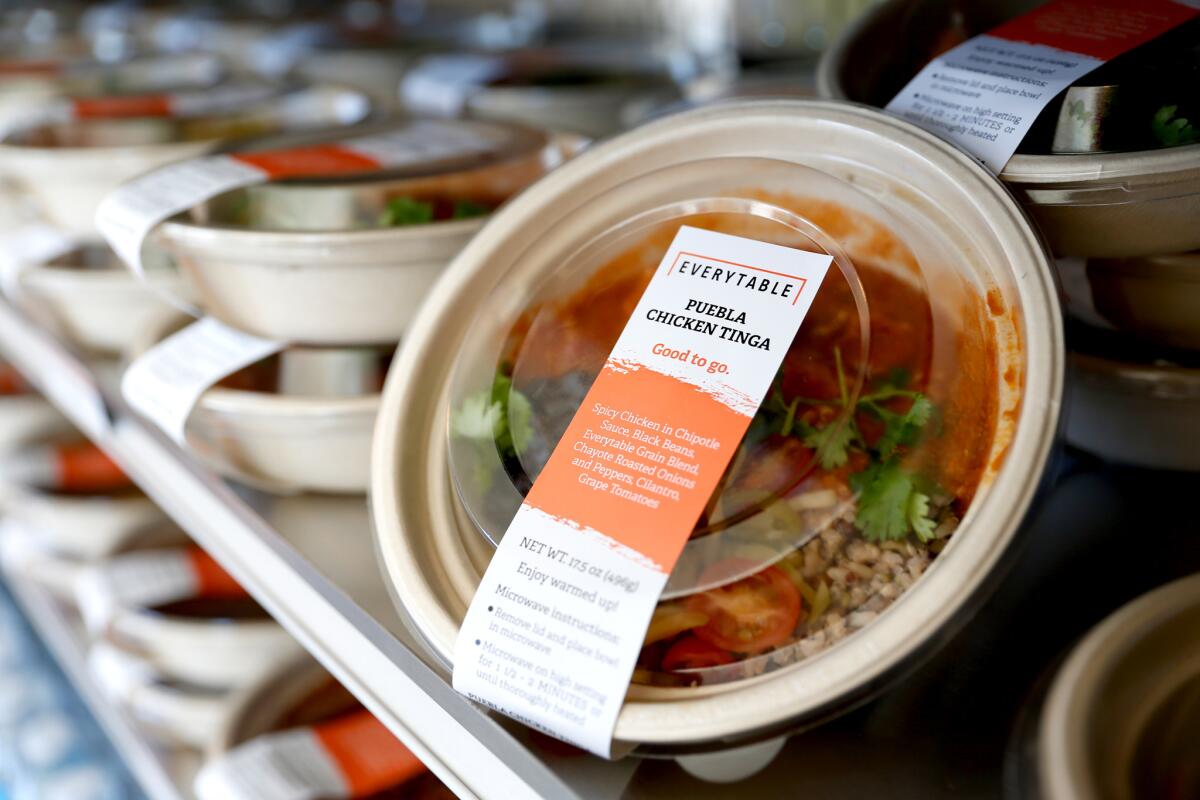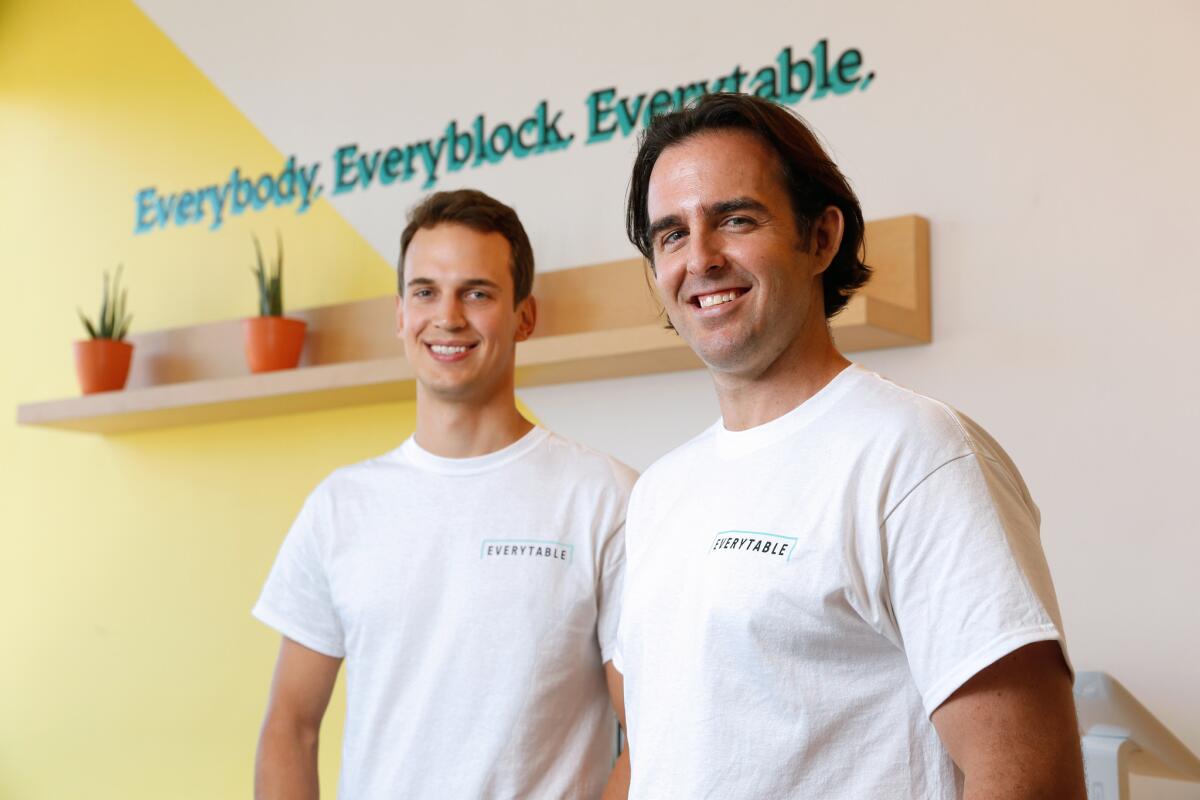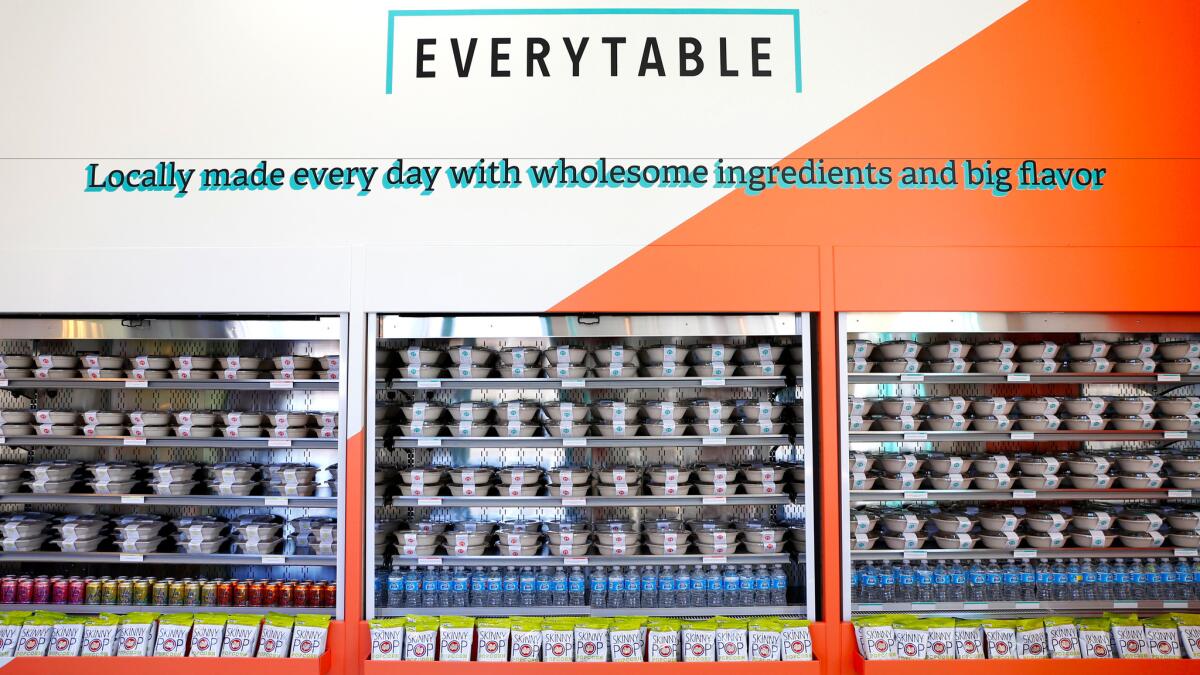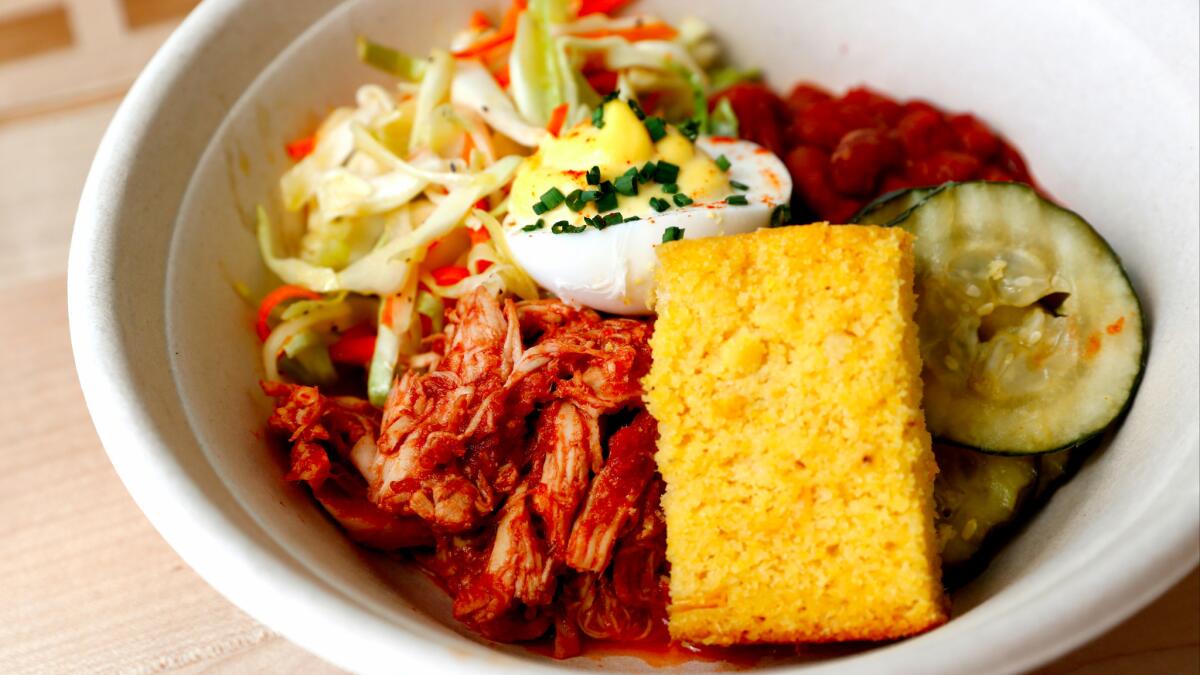This L.A. restaurant will charge different prices for the same meal, based on the neighborhood

- Share via
In a small storefront on Union Avenue and West 23rd Street in South Los Angeles sits Everytable, a new grab-and-go restaurant that opens July 30.
Inside, dozens of meals prepared by chef Craig Hopson — who a few years ago was cooking at the lauded New York City restaurant Le Cirque — fill the shelves, waiting to be microwaved. There’s a Jamaican jerk chicken dish, made with coconut rice, beans, kale and plantains; a bowl of spaghetti squash and turkey-quinoa meatballs, designed to be a kids meal; and a Puebla chicken tinga, a version of the classic Mexican dish made with chipotle sauce, a blend of grains and chayote-roasted onions and peppers.
At the new restaurant, each of these dishes is priced around $4. And when Everytable opens in downtown L.A. later this summer, these same bowls will cost around $8. This is the Everytable model.
See the most-read stories in Life & Style this hour >>
Everytable is a new concept designed to feed every community. Diners can walk in, grab a prepared meal and either heat it up with available microwaves and eat it at the restaurant, or take it away to eat at home. Everything is priced to be affordable to everyone, regardless of income.
There are plans to open an Everytable in Boyle Heights, Inglewood, Compton, Santa Monica, West Hollywood and other L.A. neighborhoods.
The restaurant is opening in the middle of a growing effort to bring accessible, healthful food and food education to low-income areas of Los Angeles. It’s an idea that’s been gaining momentum, with the opening of Locol, Roy Choi and Daniel Patterson’s affordable fast-food restaurant in Watts, where the two chefs hire from the surrounding community to staff the restaurant.
Started by business partners Sam Polk, an ex-Wall Street hedge fund trader, and David Foster, a former private equity executive, Everytable uses a variable pricing model. Translation: Food will be priced based on the neighborhood.
It’s a model the two came up with while working for Polk’s organization Groceryships, a six-month program that provides food education, temporary financial support and resources for low-income families. Foster was volunteering for Groceryships, which started in 2013, when he decided to quit his day job and start Everytable with Polk. The two began working on the idea last year.

“When we’re working on the Groceryships applications, there’s always something like a single mom making around $1,200 a month, spending $750 on rent with four kids,” said Polk, who added there are 150 people on the wait list to get into the program. “For that mom, there’s a huge difference between a meal that costs $3.50 and one that costs $5. On the Westside or downtown or Pasadena, people are used to paying $14 at Tender Greens for a salad and $9 for green juices. So food is sold according to the neighborhood we are in to make sure it’s truly affordable in every community.”
Polk said he uses “ZIP Code-level per capita income data” (it’s available to the public with an online census search) to determine neighborhood pricing. He and Foster research what the average income is in a neighborhood, then price dishes accordingly, in an attempt to make them affordable.
“What we’ve tried to implement is delivering great value wherever we are,” Foster said. “So even though the pricing will be different between here and downtown, the price is going to be lower than whatever else is in that neighborhood.”
SIGN UP for the free In the Kitchen newsletter »
The $3.95 salads served at the South L.A. location and the $8 salads coming soon to the downtown L.A. location will be made exactly the same way, with the same ingredients (organic when available and sourced as much as possible from local farms), in the same central kitchen, where all Everytable meals are made. Foster and Polk are leasing a space in Redondo Beach, but the two have plans to move into a larger space in South L.A. later this year.
Funding for Everytable comes from more than 50 investors, including Toms Social Entrepreneurship Fund (yes, it’s associated with the shoe company) and Lerer Hippeau Ventures, a technology venture capital firm based in New York City.
“Can you produce the same meals but make sure that low-income people have access to the same meals that wealthy people do?” said Robert Egger, founder of L.A. Kitchen, a nonprofit that runs a culinary job-training program in Los Angeles for former inmates and those leaving the foster care system. Egger said he has served as an unofficial advisor to Polk for years. “I just think Sam and the Everytable model is one of the most exciting experiments of food democracy in L.A. and in America.”

Polk and Foster keep prices down with grab-and-go items and a central kitchen model by eliminating the need for a waitstaff or kitchen space at each location. Two employees will staff the store, guests will heat their own food with available microwaves and seat themselves.
“If you walk into Chipotle, what you’ll see is a 2,500-square-foot space, 15 employees, a fully built-out commercial kitchen, all of which is why they will never sell a $4 burrito,” Polk said. “If we package the food in to-go containers, then we can open storefronts that are 500 to 700 square feet, two employees, so we can cut out a lot of the excess cost with the model and pass that onto consumers.”
The Everytable space in South L.A. may be small, with an area for heating food and a couple of tables, but Foster and Polk said they really paid attention to the design — by the Gensler architect firm— which includes bright yellow and orange colors. (The location used to be the Groceryships office.) With modern, minimal furniture, clean lines and bold lettering on the walls spelling out the restaurant’s mission, It looks like a restaurant you might find in Silver Lake or Venice Beach.
“We really wanted customers to have this incredible experience where the food is delicious, but also the environment was beautiful and showed a tremendous amount of respect for the customers,” Polk said. “And the menu has really been created as a way to show respect to various cultures and communities within Los Angeles.”
Hopson, the chef, worked with some of the families enrolled in the Groceryships program to come up with the menu, which includes a pozole with baked tortilla chips ($3.95), Yucatan chili with chickpeas and ancho chile ($3.95) and a Vietnamese chicken salad with mung bean noodles and lemongrass chicken ($3.95).
A team of about 15 people prepare the food for Everytable, including Hopson and culinary director Johnny Yoo of A-Frame, Choi’s Hawaiian soul food restaurant in Culver City.
“They are all hired from the surrounding community, and a lot of them come through Groceryships or other nonprofits,” Polk said.

The idea of hiring within the community is something familiar to Egger. His organization, L.A. Kitchen, gives people the culinary skills they need to find jobs, then helps them actually find the jobs. It’s part of a larger effort to bring healthful food to more communities and get the people living there involved in the selection process.
“We’ve got a generation raised on the Food Channel, and even amongst poor populations, there is a heightened awareness of nutrition and a greater demand for access,” said Egger, who also credits the Affordable Care Act with helping to bring nutrition awareness to more people. “More doctors are talking about fruit and vegetables. While food-service professionals want to innovate within our own field, now our innovation is met by an enthusiastic consumer base that wasn’t around before.”
Polk and Foster also have a connection to Father Greg Boyle, who founded Homeboy Industries, an organization that provides training to former gang members and previously incarcerated men and women. Boyle helped launch Polk’s Groceryships by running its pilot program out of Homeboy Industries in 2013.
For Polk and Foster, the Everytable location in South L.A. is the beginning. Because each restaurant is for-profit, Polk and Foster are aiming to raise enough capital to open more locations.
“We’re hoping to get four locations open by the end of the year,” Foster said. “And then hopefully 10-plus locations by the end of 2017.”
The second Everytable, opening later this year, will be at 700 S. Flower St. in downtown.
Everytable is having its grand opening party from 11 a.m. to 3 p.m. Saturday, July 30, with free meals, face painting and a bounce house. 1101 W. 23rd St., Los Angeles, (213) 973-5095, www.everytable.com.
ALSO:
L.A. Kitchen gives its students the ingredients for a better life
South L.A. women changed their lives. And it started with food
For traditional fesenjoon and rosewater ice cream, head to Dizin Persian Cuisine in Reseda
More to Read
Eat your way across L.A.
Get our weekly Tasting Notes newsletter for reviews, news and more.
You may occasionally receive promotional content from the Los Angeles Times.











